Papers by Andréia De Bernardi
Diálogo
O artigo apresenta os resultados parciais de pesquisa-ação realizada junto a mulheres bordadeiras... more O artigo apresenta os resultados parciais de pesquisa-ação realizada junto a mulheres bordadeiras em Belo Horizonte, Minas Gerais. Ao compartilhar memórias, suas trajetórias são ressignificadas pela mobilização de imagens alternativas aos desenhos prontos e estereotipados que povoam suas artesanias. Constituindo-se como um percurso teórico-prático de design social vislumbramos seu potencial em promover a reinvenção da comunidade e do território e, num escopo ampliado em consonância com o pensamento do educador Paulo Freire, estimular a consciência crítica e a autonomia.
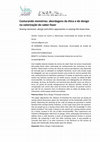
Blucher Design Proceedings
Este trabalho aborda relações do ensino do saber-fazer da costura levantando discussões éticas so... more Este trabalho aborda relações do ensino do saber-fazer da costura levantando discussões éticas sobre valorização do conhecimento das artesanias no seio familiar. Observando o ensino do ofício da costura percebemos uma demanda de mercado que se sobrepõe às tradições familiares, assim este estudo surge da indagação: por que as pessoas buscam uma escola de costura quando têm este conhecimento em familiares próximos? O estudo se desenrola a partir de relatos das histórias ouvidas em um ateliê costura, situado na cidade de Belo Horizonte/MG. As vivências são relacionadas com bibliografias de referências do design, da ética, da filosofia e da memória para abordar como um ofício se torna um ponto de tensão intergeracional em diversas famílias. Através da comparação com outros dois casos de ensino de fazeres, foi possível concluir que não há um consenso claro na literatura sobre as ações do design com o artesanato, sendo espaço amplo para debate.
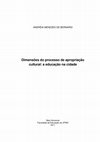
Esta dissertacao apresenta pesquisa realizada em busca das possiveis dimensoes do processo de apr... more Esta dissertacao apresenta pesquisa realizada em busca das possiveis dimensoes do processo de apropriacao cultural em experiencias de ampliacao da jornada escolar que propoem a educacao na cidade. A pesquisa teve como cenario Belo Horizonte, em Minas Gerais, e como locus unidade de ensino participante do Programa Escola Integrada, proposto e implantado pela Secretaria Municipal de Educacao. Focalizando o perfil e as praticas dos Professores Coordenadores responsaveis pelo programa em cada escola envolveu a criacao de um blog, observacao de campo de cunho etnografico, coleta de dados por meio de aplicacao de questionarios e realizacao de entrevista em profundidade. Em interlocucao com outros campos do conhecimento, parte do pressuposto de que concepcoes derivadas do conceito de Educacao Integral e taticas empregues pelos profissionais em direcao ao espaco urbano possam influenciar positivamente criancas e jovens, ampliando as chances de desenvolverem lacos de pertencimento para o usu...
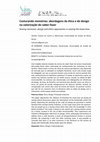
Anais 14º Congresso Brasileiro de Pesquisa e Desenvolvimento em Design, 2022
Este trabalho aborda relações do ensino do saber-fazer da costura levantando discussões éticas so... more Este trabalho aborda relações do ensino do saber-fazer da costura levantando discussões éticas sobre valorização do conhecimento das artesanias no seio familiar. Observando o ensino do ofício da costura percebemos uma demanda de mercado que se sobrepõe às tradições familiares, assim este estudo surge da indagação: por que as pessoas buscam uma escola de costura quando têm este conhecimento em familiares próximos? O estudo se desenrola a partir de relatos das histórias ouvidas em um ateliê costura, situado na cidade de Belo
Horizonte/MG. As vivências são relacionadas com bibliografias de referências do design, da ética, da filosofia e da memória para abordar como um ofício se torna um ponto de tensão intergeracional em diversas famílias. Através da comparação com outros dois casos de ensino de fazeres, foi possível concluir que não há um consenso claro na literatura sobre as ações do design com o artesanato, sendo espaço amplo para debate.
This paper approaches the relations of teaching the know-how of sewing by raising ethical discussions about the valorization of the handicrafts within the family. Observing the teaching of the craft of sewing we perceived a market demand that overlaps family traditions, so this study arises from the question: why do people go to a sewing school when they have this knowledge in close family members? The study is based on the reports of a sewing teacher owner of a School, located in the city of Belo Horizonte/MG. Their experiences are related to bibliographic references on design, ethics, philosophy and memory to address how a craft becomes a point of intergenerational tension in several families. By comparing it with two other teaching cases, it was possible to
conclude that there is no clear consensus in the literature on the actions of design with handicrafts, being ample space for debate.

THE DESIGN AFTER_THE DESIGN AFTER CUMULUS 2019, 2019
The Lagoinha Complex is one of the most emblematic regions of Belo
Horizonte, capital of the stat... more The Lagoinha Complex is one of the most emblematic regions of Belo
Horizonte, capital of the state of Minas Gerais, Brazil. However, nowadays,
the place coexists with serious social issues and the absence of public
regeneration policies contributes to the devaluation of its history and
culture, generating a vicious circle of degradation and abandonment.
Dialoguing with theoretical references from the human and social
sciences, we will present the experience of the project "Lagoinha_Heritage
Design Development", linked to the Integrated Center of Social Design
/ CIDS – Design School of the Minas Gerais State University and
implemented during the year 2018 with a group of elderly women living
in Lagoinha Complex who participated in all stages of the project: from
research to evaluation, through design and production.
A careful listening to the problems, desires and the imaginary of the
community had a special relevance for the articulation of theoretical
and practical actions, resulting in the production of collages, mixing
Lagoinha of yesterday and today with individual and collective memories.
The identification and valorization of these elements has sought to reveal
subjectivities and different ways of assigning meanings to the territory, as
a form of narrating and divulging life and territory stories, the group has
chosen to create a product from the produced collages: a set of postcards.
Thus, in the article we will highlight the theoretical-projectual pathway,
mediated by tools of design and art education as socially engaged
practices for reinventing territories.
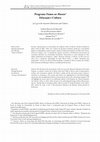
Cadernos do CEOM, 2021
Palavras chave: Educação patrimonial Arte educação "Vamos ao Museu?" Resumo: Apresentaremos as ca... more Palavras chave: Educação patrimonial Arte educação "Vamos ao Museu?" Resumo: Apresentaremos as características do Programa Vamos ao Museu?, iniciativa realizada em Minas Gerais de 2006 a 2016 com o objetivo de aproximar estudantes, professores e comunidades ligados a escolas públicas e espaços museais, visando contribuir para despertar um olhar mais curioso e sensível em relação à arte e ao patrimônio cultural, e promover o fortalecimento dos processos de construção identitária nas comunidades bene ciadas. Destacaremos as ações realizadas em duas edições emblemáticas do Programa: a edição "Natureza, Educação e Cultura", em 2013, que teve como foco o patrimônio arqueológico de Pains, Minas Gerais, e a edição "Interpretar para Empreender", com foco na obra de Vassily Kandinsky e realizada em 2015 no âmbito do V Prêmio Ibero-Americano de Educação e Museus, concedido pelo Ibermuseos.
Revista Diálogo, 2022
Resumo: O artigo apresenta os resultados parciais de pesquisa-ação realizada junto a mulheres bor... more Resumo: O artigo apresenta os resultados parciais de pesquisa-ação realizada junto a mulheres bordadeiras em Belo Horizonte, Minas Gerais. Ao compartilhar memórias, suas trajetórias são ressignifi cadas pela mobilização de imagens alternativas aos desenhos prontos e estereotipados que povoam suas artesanias. Constituindo-se como um percurso teórico-prático de design social vislumbramos seu potencial em promover a reinvenção da comunidade e do território e, num escopo ampliado em consonância com o pensamento do educador Paulo Freire, estimular a consciência crítica e a autonomia.

Presentaremos la experiencia del proyecto Lagoinha_Patrimonio Diseño Desarrollo, vinculado al Cen... more Presentaremos la experiencia del proyecto Lagoinha_Patrimonio Diseño Desarrollo, vinculado al Centro Integrado de Diseño Social, de la Escuela de Diseño de la Universidade do Estado de Minas Gerais (UEMG), Brasil, llevado a cabo en 2018/2019 junto a un grupo de adultas mayores, habitantes del Complejo Lagoinha. La metodología utilizada fue orientada por las herramientas del Diseño Centrado en las Personas, que propone tres etapas de trabajo: oír, crear y entregar. La identificación del patrimonio material e inmaterial presente en el Complejo reveló subjetividades y diferentes formas de atribución de sentidos a lo vivido. Como una forma de difundir las narrativas surgidas durante el proceso, el grupo optó por la creación de un producto: un conjunto de tarjetas postales. La escucha de los problemas, deseos y del imaginario de la comunidad fue relevante para la articulación de las acciones teórico-prácticas que resultaron en la producción de colajes en los cuales imágenes de ayer y hoy...
Journal of Higher Education Outreach and Engagement, Sep 22, 2021

Pivot 2020: Designing a World of Many Centers, 2020
Women have created alternative means of registering their own personal, as well as social, collec... more Women have created alternative means of registering their own personal, as well as social, collective memories and subjectivities in handcrafted, embroidered and other artisanal technique female narratives. The 'embroidery community' of elderly women in the Lagoinha Complex, a socially troubled urban area in Belo Horizonte, Brazil, has shown an authentic resilient attitude against historical oppressions, such as discrimination related to gender, ethnicity, education, social class, and ageism. This is a follow-up project from "Lagoinha_Heritage Design Development" developed in 2018 and 2019, focused on raising awareness and triggering discussions about the bonds established between design and memory. It has brought to light the potential of the transformative and decolonizing praxis in art and design teaching and learning process, research and outreach programs. It also highlights the social, political and activist character of these interventions in order to encourage communities to envisage and develop the necessary conditions for their well-being. Adopting the oral history approach, this action might promote the making of new imagery narratives rooted in the territory. By means of participatory design, all participants can act as co-researchers, and co-designers. We, as facilitators of this process, aim at strengthening centers at the margins, by unlearning oppression and fostering autonomy.

PROCEEDINGS OF PIVOT 2020 DESIGNING A WORLD OF MANY CENTERS VIRTUAL CONFERENCE June 4, 2020, held... more PROCEEDINGS OF PIVOT 2020 DESIGNING A WORLD OF MANY CENTERS VIRTUAL CONFERENCE June 4, 2020, held online. Organized by the Phyllis M. Taylor Center for Social Innovation and Design Thinking at Tulane University and the DRS Pluriversal Design Special Interest Group https://taylor.tulane.edu/pivot/ Editors: Renata Marques Leitão, Lesley-Ann Noel and Laura Murphy Editorial assistant: Shaymaa Abdalal Cover design: Renata Marques Leitão Cover illustration: Oksana Pasishnychenko ISBN: 978-1-912294-42-8 Introduction. Laura MURPHY Editorial Renata M. LEITÃO, Lesley-Ann NOEL FULL PAPERS Section: Deconstructing Narratives & Unlearning Hegemony Pluriversal design and desire-based design: desire as the impulse for human flourishing Renata M. LEITÃO Worlds and words: interrogating type and map as systems of power and embodied meaning-making Jane TURNER; Manuela TABOADA Racist Motifs in Design Omari SOUZA The intellectual transformation of modern design discourses in the Eastern Mediterranean Region Qassim SAAD Linguistic Integration in India: A Persistence of Hegemony Jayasri SRIDHAR Section: Decolonizing Design Education Envisioning a pluriversal design education .Lesley-Ann NOEL (De)institution Design: decolonizing design discourse in Uruguay. Lucia TRIAS CORNÚ Opening up our Gated Community. Arvind LODAYA Exploring participatory learning beyond the Institution. Leigh-Anne HEPBURN Defining the Value of Educational Equilibrium for Immigrant and At-Risk Youths Through Art Education in the 2020s and Beyond. Clovis Benjamin NELSON Section: Initiatives & Socio-Technical Tools for the Pluriverse The story of ‘The Spirit of the Hibiscus’: worldmaking activities from Bali. Britta BOYER Speculation of the Purpose of Life in 2050 from Kyoto: Case Study on Transition Design in Japan . Masaki IWABUCHI; Daijiro MIZUNO Bridging Design Prototypes & Autonomous Design. Gloria GOMEZ Prototyping a Micro-pluriverse: Performed Cosmologies to Decolonize Augmented Reality. Selwa SWEIDAN; Jessica ESCOBEDO SIBRIAN Re-defining Domestic Craft-Making: Cultivation of New Craft Practices and Identity Through the Social Media. Pelin EFİLTİ; Gizem ÇELEBİ The Role of Socio-technical Instruments in Craft and Design Practice in Indonesia. Prananda Luffiansyaha MALASAN; Meirina TRIHARINI; Muhammad IHSAN SHORT PAPERS Embracing Many Worlds: The Wixárika Calendar. María ROGAL Democratization of Design. Tanaya LAL New worlds with some tinkering.... Sucharita BENIWAL Like the Palm of My Hand: memories to redesign the city . Andréia Menezes DE BERNARDI; Edson José Carpintero REZENDE; Juliana Rocha FRANCO Starting a Feminist Design Think Tank . Isabel PROCHNER Transforming through imaginations of Otherness. Laura POPPLOW TRANSCRIPTS A Glossary for the Pluriverse. Laura MURPHY Designing to Shift Power. Alexandra ALDEN Navigating Multiple Centers of Power in R&D for Public Education. Colin ANGEVINE Social Innovation Labs for Climate Action: South to South Collaboration to Tackle Climate Change. Gabriela CARRASCO; Waldo SOTO Creating New Futures: Collaborative Design Practice. Jose COTTO; Nick JENISCH; Emilie Taylor WELTY; Rashidah WILLIAMS; Ann YOACHIM Participating in the Pluriverse from within the Academy: Design Thinking Assessment & Research. Danielle LAKE Inequalities in the participation in social learning and open innovation during crisis.Nicole LOTZ Using Cultural Probes in Design Research: A Case Study from Bungoma, Kenya. Susan WYCHE
Apresentamos a experiencia do projeto de extensao “Lagoinha _Patrimonio Design Desenvolvimento”, ... more Apresentamos a experiencia do projeto de extensao “Lagoinha _Patrimonio Design Desenvolvimento”, implementado no Complexo da Lagoinha, em Belo Horizonte. Assumindo metodologias do Design e da Arte Educacao, objetivamos inventariar memorias e diferentes formas de atribuicao de sentidos ao territorio. Como forma de difundir narrativas produzidas ao longo do processo, optou-se pela criacao de um conjunto de cartoes postais com fotocolagens, impressos em risografia e distribuidos com o intuito de fortalecer processos de reconstrucao identitaria e promover a autonomia da comunidade local.
Revista Cadernos do Ceom, 2021
Apresentaremos as características do Programa Vamos ao Museu?, iniciativa realizada em Minas Gera... more Apresentaremos as características do Programa Vamos ao Museu?, iniciativa realizada em Minas Gerais de 2006 a 2016 com o objetivo de aproximar estudantes, professores e comunidades ligados a escolas públicas e espaços museais, visando contribuir para despertar um olhar mais curioso e sensível em relação à arte e ao patrimônio cultural, e promover o fortalecimento dos processos de construção identitária nas comunidades beneficiadas. Destacaremos as ações realizadas em duas edições emblemáticas do Programa: a edição “Natureza, Educação e Cultura”, em 2013, que teve como foco o patrimônio arqueológico de Pains, Minas Gerais, e a edição “Interpretar para Empreender”, com foco na obra de Vassily Kandinsky e realizada em 2015 no âmbito do V Prêmio Ibero-Americano de Educação e Museus, concedido pelo Ibermuseos.
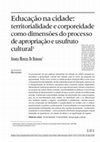
O pressuposto de que praticas educativas em direcao ao urbano possam potencializar a apropriacao ... more O pressuposto de que praticas educativas em direcao ao urbano possam potencializar a apropriacao cultural nas cidades esta no cerne da pesquisa ora apresentada. Tendo como cenario a cidade de Belo Horizonte-MG e como locus o Programa Escola Integrada, da Secretaria Municipal de Educacao, apreciou-se a ressignificacao de territorios educativos tanto constritos quanto expandidos, demandando redimensionamento do que seja educar para o direito a memoria e ao usufruto da cultura. Nesse contexto, a territorialidade se delineou como formas especificas de deslocamento e criacao de lacos sociais, postas em pratica pelas escolas. A dimensao corporeidade emergiu da observacao dos corpos/sujeitos, que, ao se movimentarem pela cidade, se identificam com e se diferenciam dos multiplos sujeitos e lugares, visualidades e ambiencias, nutrindo processos de construcao de identidades e subjetividades no contato com o urbano, transformando-o poetica e politicamente. A territorialidade e a corporeidade s...
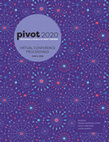
by Lesley-Ann Noel, Renata Leitao, Qassim Saad, Dr Leigh-Anne Hepburn, Jayasri Sridhar, Britta Boyer PhD, Masaki Iwabuchi, Pelin Efilti, Gizem Çelebi, Prananda L Malasan, Meirina Triharini, Maria Rogal, Sucharita Beniwal, Nicole Lotz, and Andréia De Bernardi Pivot 2020 Designing a world of many centers - Virtual Conference Proceedings, 2020
PROCEEDINGS OF PIVOT 2020
DESIGNING A WORLD OF MANY CENTERS
VIRTUAL CONFERENCE
June 4, 2020, held... more PROCEEDINGS OF PIVOT 2020
DESIGNING A WORLD OF MANY CENTERS
VIRTUAL CONFERENCE
June 4, 2020, held online.
Organized by the Phyllis M. Taylor Center for Social
Innovation and Design Thinking at Tulane University and
the DRS Pluriversal Design Special Interest Group
https://taylor.tulane.edu/pivot/
Editors: Renata Marques Leitão, Lesley-Ann Noel and Laura Murphy
Editorial assistant: Shaymaa Abdalal
Cover design: Renata Marques Leitão
Cover illustration: Oksana Pasishnychenko
ISBN: 978-1-912294-42-8
Introduction. Laura MURPHY
Editorial Renata M. LEITÃO, Lesley-Ann NOEL
FULL PAPERS
Section: Deconstructing Narratives & Unlearning Hegemony
Pluriversal design and desire-based design: desire as the impulse for human flourishing Renata M. LEITÃO
Worlds and words: interrogating type and map as systems of power and embodied meaning-making Jane TURNER; Manuela TABOADA
Racist Motifs in Design Omari SOUZA
The intellectual transformation of modern design discourses in the Eastern Mediterranean Region Qassim SAAD
Linguistic Integration in India: A Persistence of Hegemony Jayasri SRIDHAR
Section: Decolonizing Design Education
Envisioning a pluriversal design education .Lesley-Ann NOEL
(De)institution Design: decolonizing design discourse in Uruguay. Lucia TRIAS CORNÚ
Opening up our Gated Community. Arvind LODAYA
Exploring participatory learning beyond the Institution. Leigh-Anne HEPBURN
Defining the Value of Educational Equilibrium for Immigrant and At-Risk Youths
Through Art Education in the 2020s and Beyond. Clovis Benjamin NELSON
Section: Initiatives & Socio-Technical Tools for the Pluriverse
The story of ‘The Spirit of the Hibiscus’: worldmaking activities from Bali. Britta BOYER
Speculation of the Purpose of Life in 2050 from Kyoto: Case Study on Transition Design in Japan . Masaki IWABUCHI; Daijiro MIZUNO
Bridging Design Prototypes & Autonomous Design. Gloria GOMEZ
Prototyping a Micro-pluriverse: Performed Cosmologies to Decolonize Augmented Reality. Selwa SWEIDAN; Jessica ESCOBEDO SIBRIAN
Re-defining Domestic Craft-Making: Cultivation of New Craft Practices and Identity Through the Social Media. Pelin EFİLTİ; Gizem ÇELEBİ
The Role of Socio-technical Instruments in Craft and Design Practice in Indonesia.
Prananda Luffiansyaha MALASAN; Meirina TRIHARINI; Muhammad IHSAN
SHORT PAPERS
Embracing Many Worlds: The Wixárika Calendar. María ROGAL
Democratization of Design. Tanaya LAL
New worlds with some tinkering.... Sucharita BENIWAL
Like the Palm of My Hand: memories to redesign the city . Andréia Menezes DE BERNARDI; Edson José Carpintero REZENDE; Juliana Rocha FRANCO
Starting a Feminist Design Think Tank . Isabel PROCHNER
Transforming through imaginations of Otherness. Laura POPPLOW
TRANSCRIPTS
A Glossary for the Pluriverse. Laura MURPHY
Designing to Shift Power. Alexandra ALDEN
Navigating Multiple Centers of Power in R&D for Public Education. Colin ANGEVINE
Social Innovation Labs for Climate Action: South to South Collaboration to Tackle Climate Change. Gabriela CARRASCO; Waldo SOTO
Creating New Futures: Collaborative Design Practice. Jose COTTO; Nick JENISCH; Emilie Taylor WELTY; Rashidah WILLIAMS; Ann YOACHIM
Participating in the Pluriverse from within the Academy: Design Thinking Assessment & Research. Danielle LAKE
Inequalities in the participation in social learning and open innovation during crisis.Nicole LOTZ
Using Cultural Probes in Design Research: A Case Study from Bungoma, Kenya. Susan WYCHE
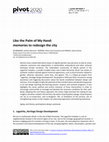
PROCEEDINGS OF PIVOT 2020 DESIGNING A WORLD OF MANY CENTERS, 2020
Women have created alternative means of registering their own personal, as well as social, collec... more Women have created alternative means of registering their own personal, as well as social, collective memories and subjectivities in handcrafted, embroidered and other artisanal technique female narratives. The 'embroidery community' of elderly women in the Lagoinha Complex, a socially troubled urban area in Belo Horizonte, Brazil, has shown an authentic resilient attitude against historical oppressions, such as discrimination related to gender, ethnicity, education, social class, and ageism. This is a follow-up project from "Lagoinha_Heritage Design Development" developed in 2018 and 2019, focused on raising awareness and triggering discussions about the bonds established between design and memory. It has brought to light the potential of the transformative and decolonizing praxis in art and design teaching and learning process, research and outreach programs. It also highlights the social, political and activist character of these interventions in order to encourage communities to envisage and develop the necessary conditions for their well-being. Adopting the oral history approach, this action might promote the making of new imagery narratives rooted in the territory. By means of participatory design, all participants can act as co-researchers, and co-designers. We, as facilitators of this process, aim at strengthening centers at the margins, by unlearning oppression and fostering autonomy.
Conference Presentations by Andréia De Bernardi
Utopia, distopia, heterotopia Paisagens culturais e políticas de formação, 2020
Arte e comunidade no EnreFAEB 2020 - Reflexões ampliadas
Talks by Andréia De Bernardi
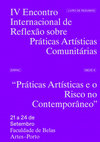
4th International Meeting of Reflection on Community Artistic Practices: Artistic Practices and Risk in the Contemporary - Abstracts book, 2021
Durante muito tempo nossa sociedade negou às mulheres as condições necessárias para o cultivo de ... more Durante muito tempo nossa sociedade negou às mulheres as condições necessárias para o cultivo de práticas de memória por meio da palavra escrita. Através da produção de artesanias, no entanto, elas romperam a hegemonia da cultura letrada e registraram suas narrativas femininas por meio de técnicas manuais transmitidas intergeracionalmente. Ao atuar junto ao grupo de mulheres idosas que participam do projeto, buscamos identificar formas de saber, ser e fazer que possam narrar a resiliência individual e coletiva frente a opressões históricas tais como a discriminação baseada em questões de etnicidade, nível de instrução, idadismo ou classe social. As narrativas e imagens geradas por meio do bordado podem ser consideradas uma forma de registro e transmissão da memória social e da história dos bairros construídos e vividos cotidianamente pelas mulheres envolvidas no projeto, em sua maioria moradoras do Complexo da Lagoinha, local que enfrenta série de problemas sociais, como a insegurança, o descaso com o patrimônio e a concentração de pessoas em situação de rua, o consumo e o tráfico de drogas. Assim, intenciona-se com essa prática refletir e provocar o debate acerca do vínculo entre Arte Educação, Design Social e Memória, iluminando o potencial dos projetos e ações socialmente engajadas, no que elas possam fortalecer o caráter político e ativista dessas intervenções, estimulando comunidades a se tornarem mais
autônomas, a imaginar e criar as condições necessárias para o seu próprio bem-viver.

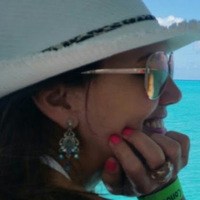





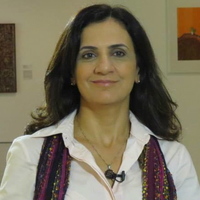


Uploads
Papers by Andréia De Bernardi
Horizonte/MG. As vivências são relacionadas com bibliografias de referências do design, da ética, da filosofia e da memória para abordar como um ofício se torna um ponto de tensão intergeracional em diversas famílias. Através da comparação com outros dois casos de ensino de fazeres, foi possível concluir que não há um consenso claro na literatura sobre as ações do design com o artesanato, sendo espaço amplo para debate.
This paper approaches the relations of teaching the know-how of sewing by raising ethical discussions about the valorization of the handicrafts within the family. Observing the teaching of the craft of sewing we perceived a market demand that overlaps family traditions, so this study arises from the question: why do people go to a sewing school when they have this knowledge in close family members? The study is based on the reports of a sewing teacher owner of a School, located in the city of Belo Horizonte/MG. Their experiences are related to bibliographic references on design, ethics, philosophy and memory to address how a craft becomes a point of intergenerational tension in several families. By comparing it with two other teaching cases, it was possible to
conclude that there is no clear consensus in the literature on the actions of design with handicrafts, being ample space for debate.
Horizonte, capital of the state of Minas Gerais, Brazil. However, nowadays,
the place coexists with serious social issues and the absence of public
regeneration policies contributes to the devaluation of its history and
culture, generating a vicious circle of degradation and abandonment.
Dialoguing with theoretical references from the human and social
sciences, we will present the experience of the project "Lagoinha_Heritage
Design Development", linked to the Integrated Center of Social Design
/ CIDS – Design School of the Minas Gerais State University and
implemented during the year 2018 with a group of elderly women living
in Lagoinha Complex who participated in all stages of the project: from
research to evaluation, through design and production.
A careful listening to the problems, desires and the imaginary of the
community had a special relevance for the articulation of theoretical
and practical actions, resulting in the production of collages, mixing
Lagoinha of yesterday and today with individual and collective memories.
The identification and valorization of these elements has sought to reveal
subjectivities and different ways of assigning meanings to the territory, as
a form of narrating and divulging life and territory stories, the group has
chosen to create a product from the produced collages: a set of postcards.
Thus, in the article we will highlight the theoretical-projectual pathway,
mediated by tools of design and art education as socially engaged
practices for reinventing territories.
DESIGNING A WORLD OF MANY CENTERS
VIRTUAL CONFERENCE
June 4, 2020, held online.
Organized by the Phyllis M. Taylor Center for Social
Innovation and Design Thinking at Tulane University and
the DRS Pluriversal Design Special Interest Group
https://taylor.tulane.edu/pivot/
Editors: Renata Marques Leitão, Lesley-Ann Noel and Laura Murphy
Editorial assistant: Shaymaa Abdalal
Cover design: Renata Marques Leitão
Cover illustration: Oksana Pasishnychenko
ISBN: 978-1-912294-42-8
Introduction. Laura MURPHY
Editorial Renata M. LEITÃO, Lesley-Ann NOEL
FULL PAPERS
Section: Deconstructing Narratives & Unlearning Hegemony
Pluriversal design and desire-based design: desire as the impulse for human flourishing Renata M. LEITÃO
Worlds and words: interrogating type and map as systems of power and embodied meaning-making Jane TURNER; Manuela TABOADA
Racist Motifs in Design Omari SOUZA
The intellectual transformation of modern design discourses in the Eastern Mediterranean Region Qassim SAAD
Linguistic Integration in India: A Persistence of Hegemony Jayasri SRIDHAR
Section: Decolonizing Design Education
Envisioning a pluriversal design education .Lesley-Ann NOEL
(De)institution Design: decolonizing design discourse in Uruguay. Lucia TRIAS CORNÚ
Opening up our Gated Community. Arvind LODAYA
Exploring participatory learning beyond the Institution. Leigh-Anne HEPBURN
Defining the Value of Educational Equilibrium for Immigrant and At-Risk Youths
Through Art Education in the 2020s and Beyond. Clovis Benjamin NELSON
Section: Initiatives & Socio-Technical Tools for the Pluriverse
The story of ‘The Spirit of the Hibiscus’: worldmaking activities from Bali. Britta BOYER
Speculation of the Purpose of Life in 2050 from Kyoto: Case Study on Transition Design in Japan . Masaki IWABUCHI; Daijiro MIZUNO
Bridging Design Prototypes & Autonomous Design. Gloria GOMEZ
Prototyping a Micro-pluriverse: Performed Cosmologies to Decolonize Augmented Reality. Selwa SWEIDAN; Jessica ESCOBEDO SIBRIAN
Re-defining Domestic Craft-Making: Cultivation of New Craft Practices and Identity Through the Social Media. Pelin EFİLTİ; Gizem ÇELEBİ
The Role of Socio-technical Instruments in Craft and Design Practice in Indonesia.
Prananda Luffiansyaha MALASAN; Meirina TRIHARINI; Muhammad IHSAN
SHORT PAPERS
Embracing Many Worlds: The Wixárika Calendar. María ROGAL
Democratization of Design. Tanaya LAL
New worlds with some tinkering.... Sucharita BENIWAL
Like the Palm of My Hand: memories to redesign the city . Andréia Menezes DE BERNARDI; Edson José Carpintero REZENDE; Juliana Rocha FRANCO
Starting a Feminist Design Think Tank . Isabel PROCHNER
Transforming through imaginations of Otherness. Laura POPPLOW
TRANSCRIPTS
A Glossary for the Pluriverse. Laura MURPHY
Designing to Shift Power. Alexandra ALDEN
Navigating Multiple Centers of Power in R&D for Public Education. Colin ANGEVINE
Social Innovation Labs for Climate Action: South to South Collaboration to Tackle Climate Change. Gabriela CARRASCO; Waldo SOTO
Creating New Futures: Collaborative Design Practice. Jose COTTO; Nick JENISCH; Emilie Taylor WELTY; Rashidah WILLIAMS; Ann YOACHIM
Participating in the Pluriverse from within the Academy: Design Thinking Assessment & Research. Danielle LAKE
Inequalities in the participation in social learning and open innovation during crisis.Nicole LOTZ
Using Cultural Probes in Design Research: A Case Study from Bungoma, Kenya. Susan WYCHE
Conference Presentations by Andréia De Bernardi
Talks by Andréia De Bernardi
autônomas, a imaginar e criar as condições necessárias para o seu próprio bem-viver.
Horizonte/MG. As vivências são relacionadas com bibliografias de referências do design, da ética, da filosofia e da memória para abordar como um ofício se torna um ponto de tensão intergeracional em diversas famílias. Através da comparação com outros dois casos de ensino de fazeres, foi possível concluir que não há um consenso claro na literatura sobre as ações do design com o artesanato, sendo espaço amplo para debate.
This paper approaches the relations of teaching the know-how of sewing by raising ethical discussions about the valorization of the handicrafts within the family. Observing the teaching of the craft of sewing we perceived a market demand that overlaps family traditions, so this study arises from the question: why do people go to a sewing school when they have this knowledge in close family members? The study is based on the reports of a sewing teacher owner of a School, located in the city of Belo Horizonte/MG. Their experiences are related to bibliographic references on design, ethics, philosophy and memory to address how a craft becomes a point of intergenerational tension in several families. By comparing it with two other teaching cases, it was possible to
conclude that there is no clear consensus in the literature on the actions of design with handicrafts, being ample space for debate.
Horizonte, capital of the state of Minas Gerais, Brazil. However, nowadays,
the place coexists with serious social issues and the absence of public
regeneration policies contributes to the devaluation of its history and
culture, generating a vicious circle of degradation and abandonment.
Dialoguing with theoretical references from the human and social
sciences, we will present the experience of the project "Lagoinha_Heritage
Design Development", linked to the Integrated Center of Social Design
/ CIDS – Design School of the Minas Gerais State University and
implemented during the year 2018 with a group of elderly women living
in Lagoinha Complex who participated in all stages of the project: from
research to evaluation, through design and production.
A careful listening to the problems, desires and the imaginary of the
community had a special relevance for the articulation of theoretical
and practical actions, resulting in the production of collages, mixing
Lagoinha of yesterday and today with individual and collective memories.
The identification and valorization of these elements has sought to reveal
subjectivities and different ways of assigning meanings to the territory, as
a form of narrating and divulging life and territory stories, the group has
chosen to create a product from the produced collages: a set of postcards.
Thus, in the article we will highlight the theoretical-projectual pathway,
mediated by tools of design and art education as socially engaged
practices for reinventing territories.
DESIGNING A WORLD OF MANY CENTERS
VIRTUAL CONFERENCE
June 4, 2020, held online.
Organized by the Phyllis M. Taylor Center for Social
Innovation and Design Thinking at Tulane University and
the DRS Pluriversal Design Special Interest Group
https://taylor.tulane.edu/pivot/
Editors: Renata Marques Leitão, Lesley-Ann Noel and Laura Murphy
Editorial assistant: Shaymaa Abdalal
Cover design: Renata Marques Leitão
Cover illustration: Oksana Pasishnychenko
ISBN: 978-1-912294-42-8
Introduction. Laura MURPHY
Editorial Renata M. LEITÃO, Lesley-Ann NOEL
FULL PAPERS
Section: Deconstructing Narratives & Unlearning Hegemony
Pluriversal design and desire-based design: desire as the impulse for human flourishing Renata M. LEITÃO
Worlds and words: interrogating type and map as systems of power and embodied meaning-making Jane TURNER; Manuela TABOADA
Racist Motifs in Design Omari SOUZA
The intellectual transformation of modern design discourses in the Eastern Mediterranean Region Qassim SAAD
Linguistic Integration in India: A Persistence of Hegemony Jayasri SRIDHAR
Section: Decolonizing Design Education
Envisioning a pluriversal design education .Lesley-Ann NOEL
(De)institution Design: decolonizing design discourse in Uruguay. Lucia TRIAS CORNÚ
Opening up our Gated Community. Arvind LODAYA
Exploring participatory learning beyond the Institution. Leigh-Anne HEPBURN
Defining the Value of Educational Equilibrium for Immigrant and At-Risk Youths
Through Art Education in the 2020s and Beyond. Clovis Benjamin NELSON
Section: Initiatives & Socio-Technical Tools for the Pluriverse
The story of ‘The Spirit of the Hibiscus’: worldmaking activities from Bali. Britta BOYER
Speculation of the Purpose of Life in 2050 from Kyoto: Case Study on Transition Design in Japan . Masaki IWABUCHI; Daijiro MIZUNO
Bridging Design Prototypes & Autonomous Design. Gloria GOMEZ
Prototyping a Micro-pluriverse: Performed Cosmologies to Decolonize Augmented Reality. Selwa SWEIDAN; Jessica ESCOBEDO SIBRIAN
Re-defining Domestic Craft-Making: Cultivation of New Craft Practices and Identity Through the Social Media. Pelin EFİLTİ; Gizem ÇELEBİ
The Role of Socio-technical Instruments in Craft and Design Practice in Indonesia.
Prananda Luffiansyaha MALASAN; Meirina TRIHARINI; Muhammad IHSAN
SHORT PAPERS
Embracing Many Worlds: The Wixárika Calendar. María ROGAL
Democratization of Design. Tanaya LAL
New worlds with some tinkering.... Sucharita BENIWAL
Like the Palm of My Hand: memories to redesign the city . Andréia Menezes DE BERNARDI; Edson José Carpintero REZENDE; Juliana Rocha FRANCO
Starting a Feminist Design Think Tank . Isabel PROCHNER
Transforming through imaginations of Otherness. Laura POPPLOW
TRANSCRIPTS
A Glossary for the Pluriverse. Laura MURPHY
Designing to Shift Power. Alexandra ALDEN
Navigating Multiple Centers of Power in R&D for Public Education. Colin ANGEVINE
Social Innovation Labs for Climate Action: South to South Collaboration to Tackle Climate Change. Gabriela CARRASCO; Waldo SOTO
Creating New Futures: Collaborative Design Practice. Jose COTTO; Nick JENISCH; Emilie Taylor WELTY; Rashidah WILLIAMS; Ann YOACHIM
Participating in the Pluriverse from within the Academy: Design Thinking Assessment & Research. Danielle LAKE
Inequalities in the participation in social learning and open innovation during crisis.Nicole LOTZ
Using Cultural Probes in Design Research: A Case Study from Bungoma, Kenya. Susan WYCHE
autônomas, a imaginar e criar as condições necessárias para o seu próprio bem-viver.